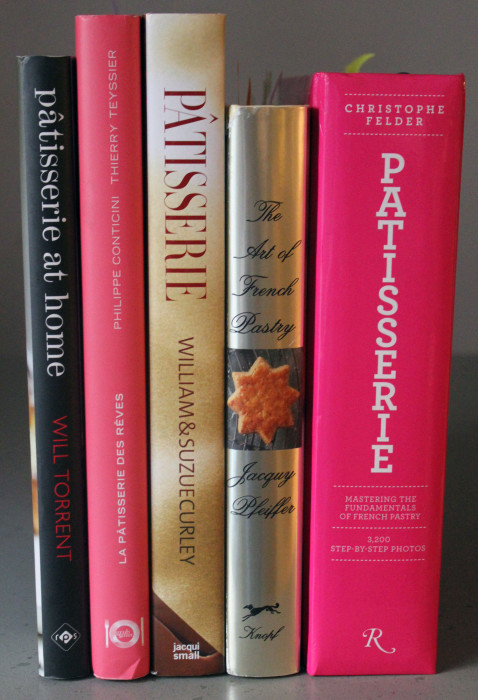The past five days I’ve reviewed five outstanding pastry books:
- Pâtisserie at Home by Will Torrent
- La Pâtisserie des Rêves by Philippe Conticini and Thierry Teyssier
- Pâtisserie by Will and Suzue Curley
- The Art of French Pastry by Jacquy Pfieffer
- Pâtisserie: Mastering the Fundamentals of French Pastry by Christophe Felder
This are five wonderful books. Oh, but you want to know which of the five you should buy? Sure, I’m happy to answer that question and, in the process, upset four authors and four publishers.
No, I won’t pick one. I can’t. I’m not you, but I can help you zero on which of the books are for you. First, you can start with the one that best meets your immediate needs, but I truly, truly believe that you’ll benefit from having two or three or all five on your bookshelf.
Let me walk you through the books. The order in which I posted really was designed to aid you.
If you want to learn, with some good instruction and assisting photos, but you don’t want to be overwhelmed, then Patisserie at Home is good beginning. After you’ve absorbed this volume, a second selection would be the more detailed Patisserie by the Curleys or Mastering the Fundamentals, which is really a Wikipedia on paper of recipes.
If you want a good cookbook, with incredible photos, and recipes that are a commercial, culinary and artistic success, then you need La Pâtisserie des Rêves. These are recipes coming from a culinary empire where the emphasis has to be on maintaining quality while engaging in heavy daily production for multiple brick and mortar locations in Paris and London. These recipes have been honed. So, if you own a bakery or want to start a baking business, and if you want to know what success looks like, then this is your starter book.
Patisserie by Will and Suzue Curley is a major work, one for both the home and the professional cook. It’s a combination again of text and photos, but there is more information densely packed here. It’s a very strong step-by-step guide.
If you learn more from text than photos, if you want to know “why” you do certain things, then there is no better book than The Art of French Pastry by Jacquy Pfieffer. Without being too technical, you get doses of kitchen chemistry, culinary architecture, and the structural engineering necessary for those composed, layered French masterpieces. How do they make that, you wonder? Well, this is the book that tells you how, and shows you, too, with both photographs and incredible diagrams that make it all transparently clear. Oh, you’ll tell yourself, that’s the trick to doing it. This is a dual book that conveys both wonderful recipes and deep understanding.
If its volume you want, then you should start with Pâtisserie: Mastering the Fundamentals of French Pastry by Christophe Felder. There are 200+ recipes here in 800 pages along with 3,200 photos. Ah, that’s the difference in this book. Yes, there are written directions for each recipe, but they are tersely presented. The real directions appear in one or two sentences below each of the 10 to 30 photos for each recipe. The photos form a masterful, totally detailed sequence of the steps need to create the treat. If you are a visual learner and really do not like to read, then this is the book for you. Actually, I would team this book up with the one by Torrent or the Curleys. These books have photos, too, but as supplements to text instructions. You just might want to experiment a bit there before transferring to photo-centric Felder.
I have all five books, of course, so it is easy to say I use and love all five. But I do. There is a role for each one and I’m sure you’ll discover the same for yourself. So, you need to clear space on your bookshelf. Make room for more than one. Use this guide to select a first book, but if you find yourself with three or four or five, you are not a hoarder. You are simply on your way to becoming a thoroughly accomplished pastry maven. That’s a great pathway in life.
Finally, if in your refrigerator you have five or more pounds of butter, you are still not a hoarder. You were probably in the Boy or Girl Scouts. What did they teach you? Be prepared. Be very prepared.

